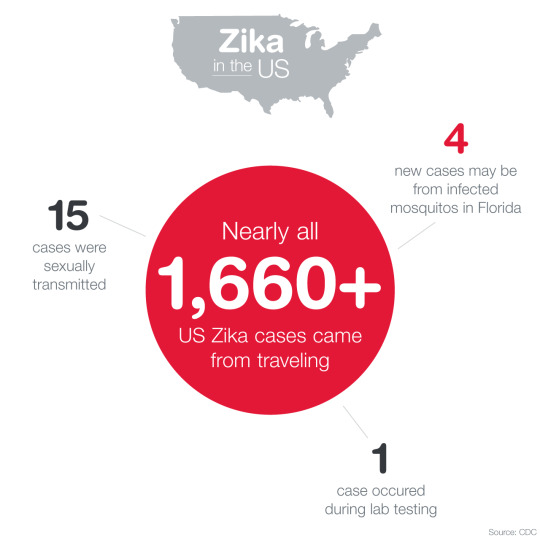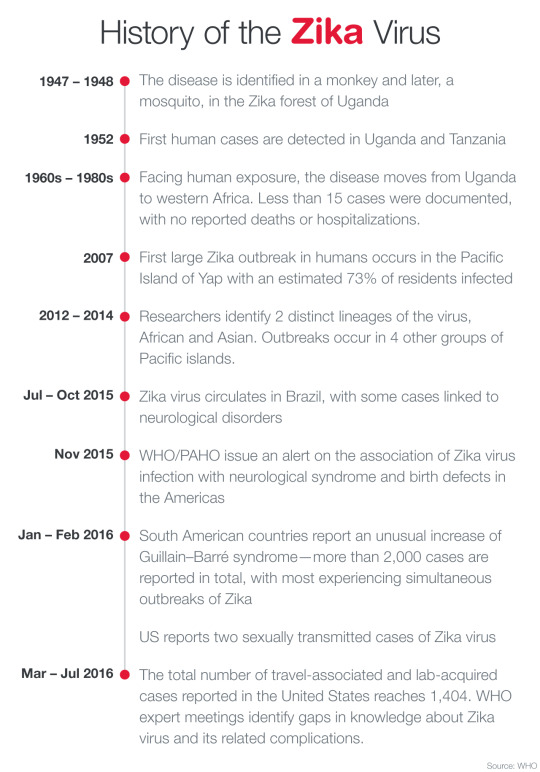
Due to its spread and reports of serious birth defects, the World Health Organization declared Zika an international public health emergency earlier this year.
Most recently, four cases of Zika virus infection in Miami are likely to have
been caused by the first locally infected mosquitoes,
as announced
by the Florida Department of Health on July 29, 2016. So far, no mosquitoes
tested have been found to be carrying the virus, and the infected cases have
not been admitted to the hospital.

Worldwide, a total of 64 countries and territories have reported evidence of mosquito-borne Zika virus
transmission since 2015. As
many as 4 million people are expected to be infected by the virus across the globe by
the end of the year. The good news is that there are steps you can take to help prevent the spread
of Zika.
1.
Zika virus is spread through a mosquito bite—and
sex.
Only the Aedes genus of mosquitos has been found to carry
Zika, along with other serious infectious diseases, including yellow fever and dengue.
These mosquitoes become infected with Zika when they bite an infected person,
and spread the virus by biting others. Fortunately, the Aedes mosquito is not
common in most parts of the U.S. aside from Florida, along the Gulf Coast and
in Hawaii.
Zika can also be passed along through sex, no matter if or
when the infected partner shows symptoms, according
to the CDC. Only people with sex partners who live in or traveled to an
area with Zika are presently at risk for getting sexually transmitted Zika.
2. Zika infections usually cause mild illnesses.
Only 1 of 5 people infected with the virus will develop any
symptoms, which can include fever, rash, joint pain and red eyes, according to the CDC.
Symptoms are typically mild and temporary, beginning 2-7 days after being
bitten by an infected mosquito and lasting several days to a week. People
usually don’t get sick enough to go to the hospital, and they very rarely die
of Zika.
3. Zika virus can be spread from a pregnant woman to her fetus.
Zika cases have been linked to microcephaly,
a condition in which infants are born with unusually small heads and damaged
brains. Pregnant women are advised against traveling to infected areas.
4. Zika may be linked to other serious illnesses.
Zika has been potential link to some cases of Guillain-Barre,
a rare syndrome in which the immune system attacks the nerves, in at least 13
countries.Other severe fetal brain defects have caused eye problems, hearing
loss and impaired growth in babies born from infected mothers. Scientists are
studying the full range of health problems that Zika virus infection may cause during
pregnancy.

5. You can protect yourself against Zika virus.
There is currently no vaccine to prevent or medicine to
treat Zika.
According to the CDC, you can protect yourself from Zika by preventing mosquito bites:
-
Cover exposed skin by wearing long-sleeved shirts and long pants.
Use EPA-registered insect repellents containing DEET, picaridin, oil of lemon eucalyptus, or IR3535. Always use as directed. - Pregnant and breastfeeding women can use all EPA-registered
insect repellents, including DEET, according to the product label. - Most repellents, including DEET, can be used on children 2
months or older. Do not apply insect repellent onto a child’s hands, eyes,
mouth, and cut or irritated skin. An
adult should spray insect repellent onto her/his hands and then apply to a
child’s face. Do not use products
containing oil of lemon eucalyptus or para-menthane-diol (PMD) on children
under 3 years old. - Stay and sleep in screened-in or air-conditioned rooms.
- When traveling to an infected area, use permethrin-treated clothing and gear (such as boots, pants, socks and tents). You can buy pre-treated clothing and gear or treat them yourself.
Visit the CDC
Travelers’ Health site and Zika hub for the most updated information.
Be well, stay well ~
Pharmacist Andy
Andy Stergachis, Ph.D., R.Ph. is the Director of the Global Medicines Program at the University of Washington in Seattle and a subject expert on public health and pharmacy-related topics.



